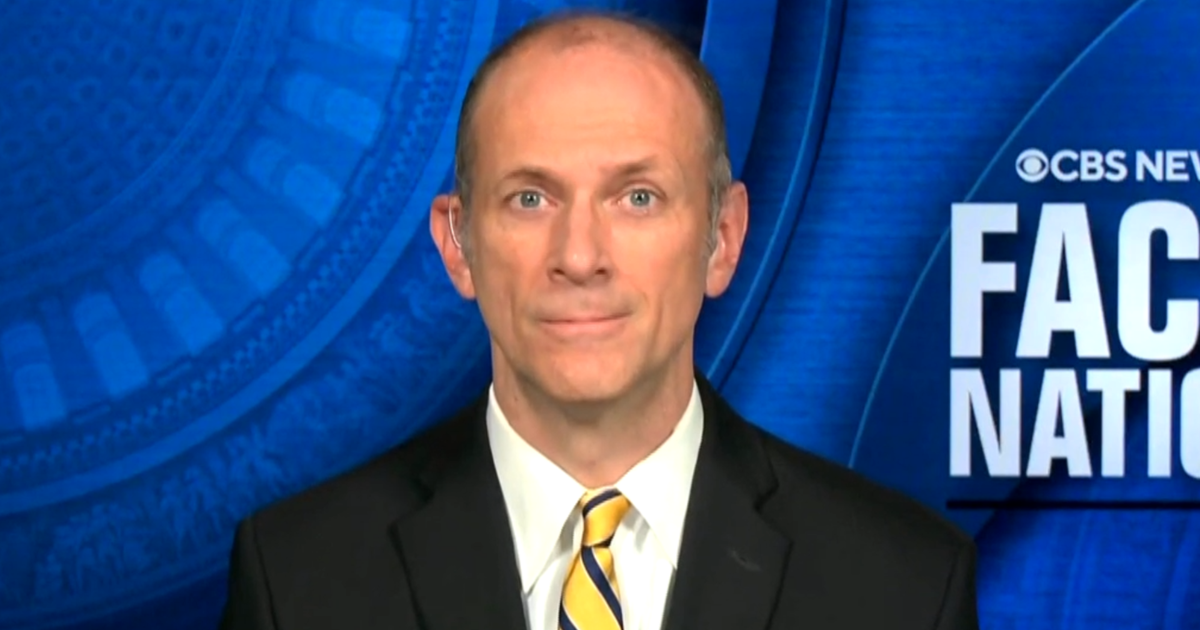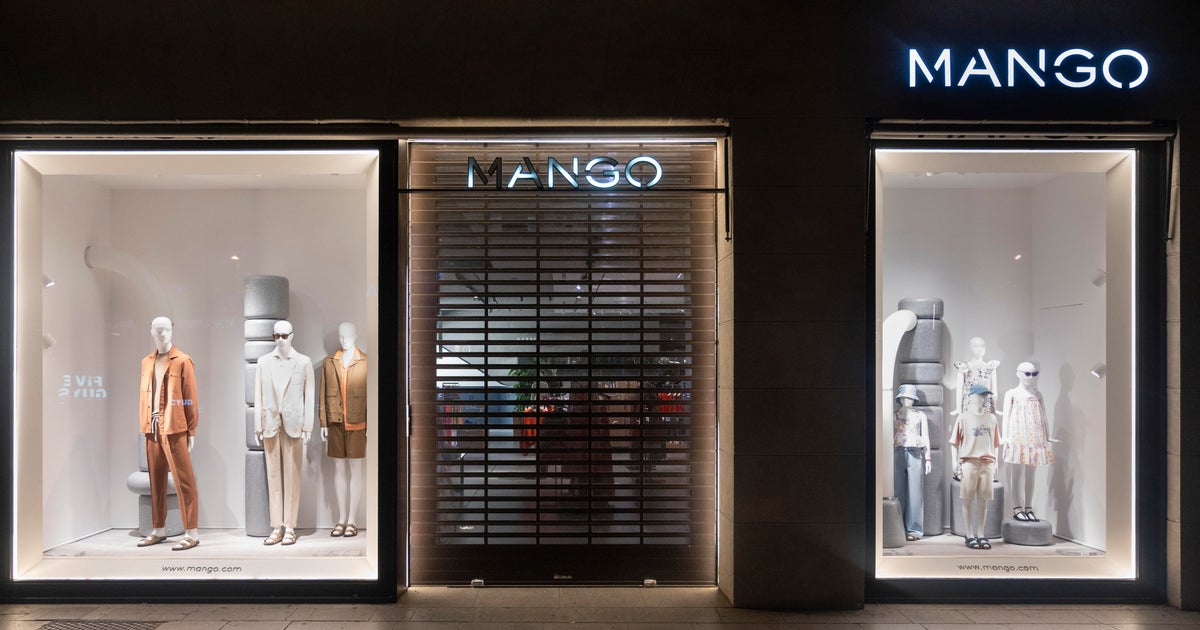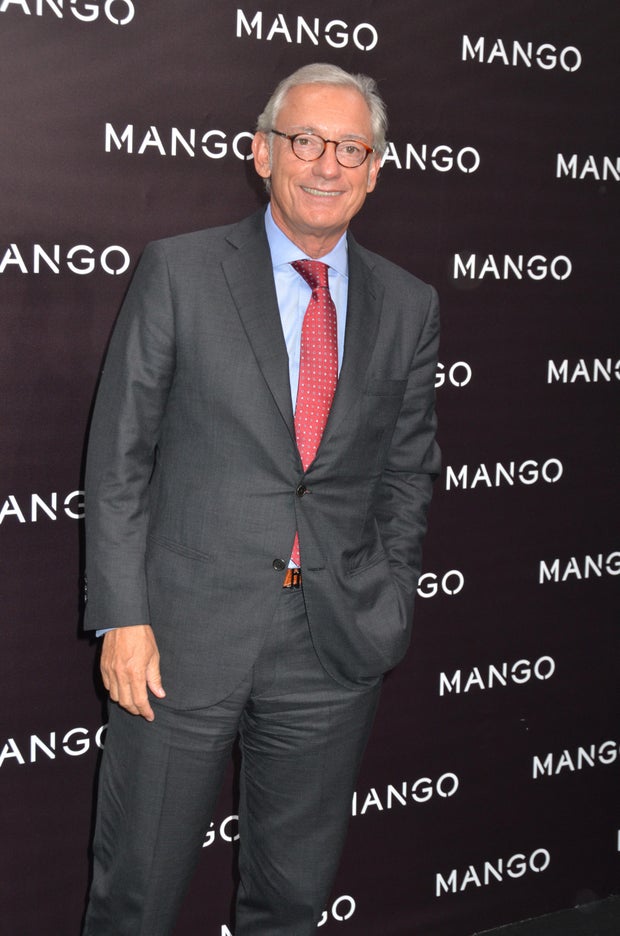CBS News
Transcript: Austan Goolsbee, president of Federal Reserve Bank of Chicago, on “Face the Nation with Margaret Brennan,” Aug. 18, 2024

The following is a transcript of an interview with Austan Goolsbee, president of Federal Reserve Bank of Chicago, on “Face the Nation with Margaret Brennan” that aired on Aug. 18, 2024.
MARGARET BRENNAN: We go now to Austan Goolsbee, the President and CEO of the Federal Reserve Bank of Chicago. Before taking on that apolitical role he had previously served in the Obama administration. Good morning to you.
AUSTAN GOOLSBEE: Hi. Great to see you again, Margaret.
MARGARET BRENNAN: So, President Goolsbee, Barron’s had a piece yesterday saying that the most consequential event this fall won’t be the U.S. election, it won’t be a war in the Middle East, it will be the Federal Reserve’s decision in September to lower interest rates for the first time in more than four years. Is that a certainty? Do you think it is time to lower rates?
GOOLSBEE: I don’t think it’s a certainty, and I- I don’t like, as you know, tying our hands ahead of time when we got a lot of data to come in and everyone on the committee is going to get to speak their piece, and it’s a- it’s a committee decision. We try, as the Fed, to make clear what our reaction function is, if you want to call it that. I invite everybody to go read the statement of economic projections, which every -in our- in our world, colloquially, we call the dot plot, where we outline every quarter, what do the members of the committee individually think will be the appropriate policy for each of the next three years, and what economic conditions do they expect to correspond with those? And we’ve been making clear for quite a while what economic conditions would be appropriate for us to cut rates, for us to hold rates where they are, and things like that. And I do think that the- we set an interest rate more than a year ago at a high level because we were fighting inflation, and the economic conditions today are very different than they were when we set the rate at this level.
MARGARET BRENNAN: So, interest rates and supply of housing impact what consumers end up paying for shelter. What is going to bring down shelter costs? Because that was such a big part of the inflation number that we just saw.
GOOLSBEE: Well, look, Margaret. You know as much as anybody about this, the biggest puzzle that we’ve seen in the inflation numbers has been the persistently high inflation rate on shelter and housing, and we- we can get a little mixed up, because that official measure is very- is a very lagging indicator of what the actual housing price conditions are on the ground. So our puzzle has been why the market rents inflation rate has come down, but that hasn’t yet been reflected into the official backward looking housing inflation. So one of the things that’s going to bring it down is just- we’re going to keep getting more data, and that’s going to get incorporated into the official series. But the second is, the interest rate, how it works, how the Fed stabilizes the Business Cycle, is when it tightens the screwdriver, the interest rate goes up and the demand for housing goes down and so some of those interest rate sensitive sectors of the economy, weakness in that is partly how the monetary transmission takes place and the inflation rate softens. And it’s worth noting that last year, inflation fell by almost as much as it has ever fallen in a single year in the United States, and that happened without a recession which is unparalleled. So we’re hoping to continue some of that as we go through ’24.
MARGARET BRENNAN: That’s part of the delicate dance the Fed is doing here. Bank of America’s CEO was with us last week on- on “Face the Nation,” and he told us his economists are no longer predicting a recession, but he did say there’s a risk if the Fed does not start to move rates down. Take a listen.
(BEGIN SOUND ON TAPE)
BRIAN MOYNIHAN: They’ve told people rates probably aren’t going to go up, but if they don’t start taking them down relatively soon, you could dispirit the American consumer. Once the American consumer really starts going very negative, then it’s hard to get them back.
(END SOUND ON TAPE)
MARGARET BRENNAN: He also said corporations aren’t using their lines of credit due to the higher rates. What do you make of that caution?
GOOLSBEE: I think it’s a valid caution when rates are this high, if you take measure of how tight the Fed is as just a What’s the rate minus what’s the inflation rate, when you set a rate high like we have, and hold it there while inflation falls, you’re actually tightening. Credit conditions are getting tighter. And when we go out in the Chicago seventh district, you can hear from business leaders and community leaders around the district that credit conditions on them are tight when your bank loans and what the rates they pay and credit availability is tight. So I think he’s right. I think you got to have a caution when you see small business defaults rising like they have been rising. When you see consumer credit delinquencies, credit card delinquencies rising like they’ve been rising, those are warning signs. Now there’s, there’s some others that are more positive, but they’re, they’re definitely of concern. And if you keep too tight for too long, you will have a problem on the employment side of the Fed’s mandate.
MARGARET BRENNAN: So a recession for you? Is it off the table?
GOOLSBEE:
No, look. You’ve seen the table at the FOMC committee –
MARGARET BRENNAN: –I know–
GOOLSBEE: –a huge table–
MARGARET BRENNAN: I know
GOOLSBEE: Everything is always on the table. When there’s possibility of recession. The last GDP growth number was higher than expected. So that was a that was one of the bright spots. But you always got to worry about every contingency. That’s the job of the central banker.
MARGARET BRENNAN:
I want to ask you as well about what’s happening with what people pay at the grocery store. The San Francisco Fed found that corporate markups, what some might call price gouging, are not a primary contributor to inflation. Do your economists agree?
GOOLSBEE:
Well, look this, this has turned into a campaign election kind of battleground. So I’m not–
MARGARET BRENNAN: –I’m not asking a political question–
GOOLSBEE: We’re not in elections business. I’m not going to get into that. I think that it’s worth remembering that there are dynamics at play that is over time, wages tend to move slower than prices. So if some shock hits, prices go up, then wages go up, then prices come down, then wages come down. And so if you look at any given moment, that markup sort of the difference between what’s happening to prices and what’s happening to costs that can vary a lot over the business cycle. So I just caution everybody over concluding from any one observation about markups.
MARGARET BRENNAN: Are tariffs inflationary?
GOOLSBEE:
It sounds funny to say. It depends what you mean by inflationary. Tariffs raise prices, but in terms of something that, inflationary is about the rate of growth of prices, a one time increase in costs will raise prices, but is not an extended inflationary thing. So whether you want to call that inflationary or not, they raise costs and they raise prices.
MARGARET BRENNAN
Austan Goolsbee, we want your perspective as one of the top economists in the country. I know you left politics behind, and I’ve made you a little uncomfortable by asking you some of these questions, but we want to bottom line it.
GOOLSBEE:
You’re the smartest in the business. Margaret, any time you want to talk Fed mandate, inflation or employment, I’m, I’m always, I’m always up for it.
MARGARET BRENNAN
All right. Austan Goolsbee, thank you for your time. We’ll be back in a moment.
CBS News
Blinken publicly confirms U.S. officials have been in direct contact with the Syrian rebel group that ousted Assad

U.S. Secretary of State Antony Blinken said Saturday that American officials have been in direct contact with the Syrian rebel group that spearheaded the overthrow of President Bashar al-Assad’s government but is designated a foreign terrorist organization by the United States and others.
Blinken is the first U.S. official to publicly confirm contacts between the Biden administration and Hayat Tahrir al-Sham, or HTS, which led a coalition of armed opposition groups that ousted Assad from power last Sunday.
Speaking at a news conference in Aqaba, Jordan, Blinken would not discuss details of the contacts but said it was important for the U.S. to convey messages to the group about its conduct and how it intends to govern in a transition period.
“Yes, we have been in contact with HTS and with other parties,” Blinken said. He added that “our message to the Syrian people is this: We want them to succeed and we’re prepared to help them do so.”
Blinken also said that officials are “also communicating directly with those in positions of authority in Syria.”
Andrew Caballero-Reynolds/AFP via Getty Images
HTS, which was once an affiliate of al-Qaida, has been designed as a foreign terrorist organization by the State Department since 2018. That designation carries with it severe sanctions, including a ban on the provision of any “material support” to the group or its members. The sanctions do not, however, legally bar U.S. officials from communicating with designated groups.
In an interview Saturday on Syrian television, the group’s leader, Ahmad al-Sharaa, formerly known as Abu Mohammed al-Golani, did not address any direct contact with the United States, but said the new authorities in Damascus, the capital, are in touch with Western embassies.
HTS has worked to establish security and start a political transition after seizing Damascus and has tried to reassure a public both stunned by Assad’s fall and concerned about extremist jihadis among the rebels. Insurgent leaders say the group has broken with its extremist past.
Al-Sharaa appeared in a video message Friday congratulating “the great Syrian people for the victory of the blessed revolution.”
U.S. officials say al-Sharaa has been making welcome comments about protecting minority and women’s rights but remain skeptical that he will follow through on them in the long run.
“We know that what happens inside of Syria can have powerful consequences well beyond its borders, from mass displacement to terrorism, and we know that we can’t underestimate the challenges of this moment and in the weeks and months ahead,” Blinken said Saturday.
On Friday, the rebels and Syria’s unarmed opposition worked to safely turn over to U.S. officials an American man who had been imprisoned by Assad.
Blinken said U.S. officials are continuing “our own dogged, determined efforts” as they search for Austin Tice, an American journalist who disappeared 12 years ago near Damascus.
“We have impressed upon everyone we’ve been in contact with the importance of helping find Austin Tice and bringing him home,” Blinken said.
Travis Timmerman, the American who said he was freed from a Syrian prison after Assad’s ouster, was taken out of the country by the U.S. military, CBS News reported earlier this week.
CBS News
Suspect in the killing of UnitedHealthcare’s CEO hires former Manhattan prosecutor

Luigi Mangione, the suspect in the killing of UnitedHealthcare’s CEO, has added a prominent defense lawyer to his legal team as Manhattan prosecutors work to return him from Pennsylvania to face a murder charge.
Mangione will be represented by Karen Friedman Agnifilo, who was a high-ranking deputy in the Manhattan district attorney’s office for years before entering private practice. Friedman Agnifilo’s law firm, Agnifilo Intrater LLP, confirmed in a statement late Friday that she had been retained to represent Mangione. The firm said she will not be commenting on the case at this time.
According to her firm’s website, “A public servant for nearly three decades, Karen Friedman Agnifilo left the government as the Chief Assistant District Attorney in the Manhattan District Attorney’s Office, a role she held from 2014 through 2021.”
Mangione was arrested Monday after a customer at a McDonald’s in Altoona, Pennsylvania, saw him eating breakfast and noticed a resemblance to the person being sought by police in the Dec. 4 killing of Brian Thompson in Manhattan.
CBS News
Police say Mangione was found with a gun, mask and writings linking him to the ambush outside the New York Hilton Midtown, where Thompson was arriving for his company’s annual investor conference.
The New York Police Department told CBS News that there are no indications that Mangione was a UnitedHealthcare customer.
Mangione, 26, remained jailed without bail Saturday in Pennsylvania, where he was initially charged with gun and forgery offenses. Altoona is about 230 miles west of New York City.
Mangione’s lawyer there, Thomas Dickey, has cautioned against prejudging the case and said that his client would contest his extradition to New York.
But Manhattan District Attorney Alvin Bragg said Friday that there were indications Mangione may now give up on that fight.
“We going to continue to press forward on parallel paths, and we’ll be ready whether he is going to waive extradition or whether he is going to contest extradition,” Bragg said at an unrelated press conference in Times Square.
Hours after Mangione’s arrest on Monday, Bragg’s office filed paperwork charging him with five counts, including intentional murder, criminal possession of a weapon and criminal possession of a forged instrument.
New York Gov. Kathy Hochul has said she’s prepared to ask her Pennsylvania counterpart, Gov. Josh Shapiro, to intervene and issue a governor’s warrant requiring Mangione’s extradition if he does not agree to be moved voluntarily.
Mangione’s new lawyer has made frequent TV appearances, including as a CNN legal analyst, co-hosts a weekly podcast and is the legal adviser for “Law & Order.”
Her husband and law partner Mark Agnifilo is representing Sean “Diddy” Combs in the hip-hop mogul’s Manhattan federal sex trafficking case.
CBS News
Spain’s Mango clothing chain founder dies in accident

Isak Andic, the founder of Spanish clothing retailer Mango, one of Europe’s largest fashion groups with nearly 2,800 stores worldwide, died Saturday in an accident, the company said.
Photo by Foc Kan/WireImage via Getty
“It is with deep regret that we announce the unexpected death of Isak Andic, our non-executive chairman and founder of Mango,” the Barcelona-based company’s CEO, Toni Ruiz, said in a statement.
“Isak has been an example for all of us. He dedicated his life to Mango, leaving an indelible mark thanks to his strategic vision, his inspiring leadership and his unwavering commitment to values that he himself imbued in our company,” he added.
The company did not provide further details about the accident. Spanish media said the 71-year-old died after falling while hiking with several members of his family near Barcelona.
Spanish Prime Minister Pedro Sanchez said in a post on social media, “My condolences to the family of Isak Andic, founder of Mango, on his tragic death in an accident in the Salnitre de Collbató caves.” He added, “All my love and recognition for your great work and business vision, which has turned this Spanish firm into a world leader in fashion.”
Mango traces its origins to 1984, when Andic, who is of Turkish origin, opened his first shop on the Paseo de Gracia, Barcelona’s famous shopping street, with the help of his older brother Nahman.
It was hugely successful. Spain had just emerged from a decades-long dictatorship that ended with the death of General Francisco Franco in 1975, and consumers were hungry for more modern clothes.
“His departure leaves a huge void, but we are all, in some way, his legacy and the testimony of his achievements. It is up to us, and this is the best tribute we can make to Isak and which we will fulfill, to ensure that Mango continues to be the project that Isak aspired to and of which he would be proud,” Ruiz said.
Mango has consolidated its position as one of the leading international fashion groups, with a major presence in more than 120 markets and 15,500 employees worldwide, according to its website.




